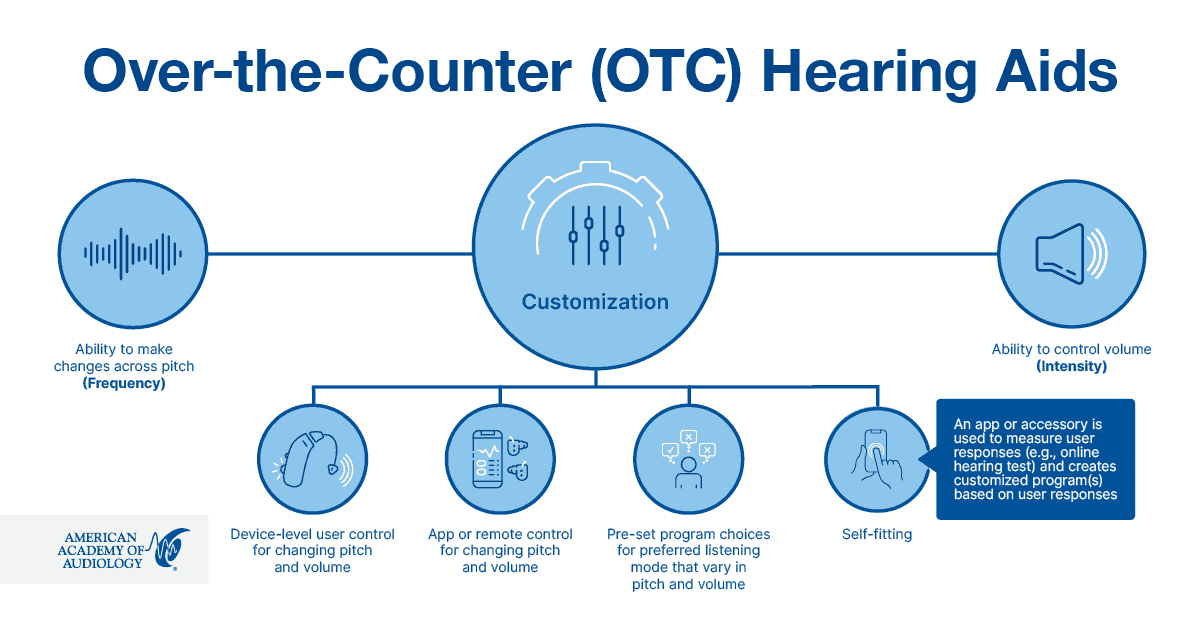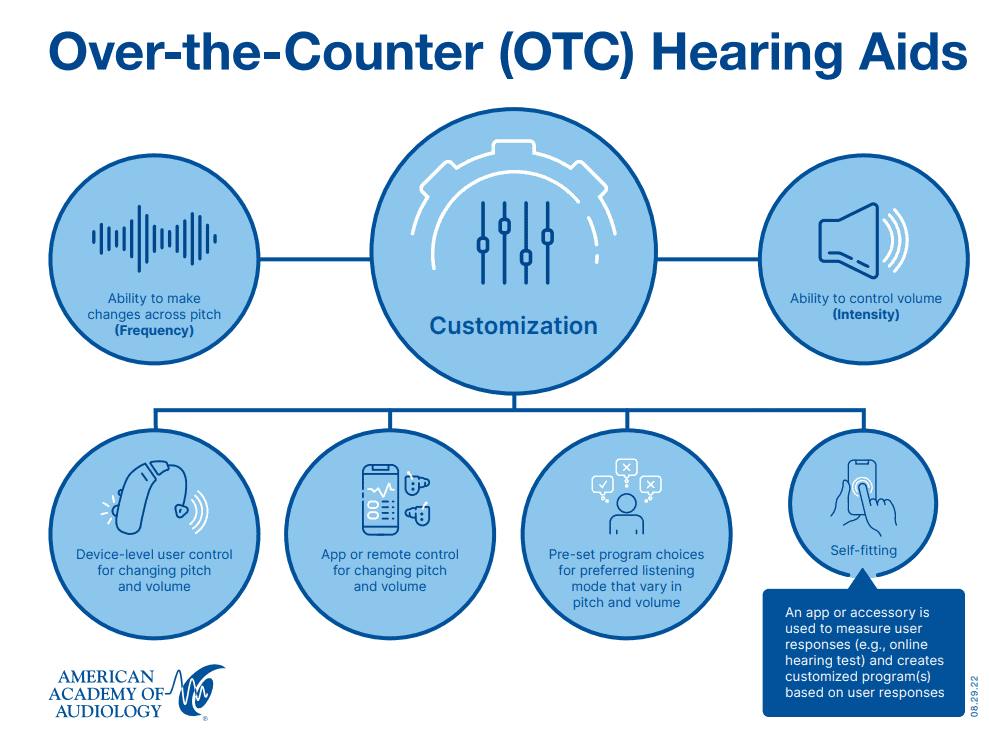Closed captioning is available.
Sarah Sydlowski, AuD, PhD, MBA, CISC, ABA Certified, asks how will you know if you're hearing as well as you should be? Your hearing connects you to other people; trust an audiologist to help you find the right device for your hearing needs.
What Are OTC Hearing Aids?
Over-the-counter (OTC) hearing aids are devices that make sounds louder.
OTC hearing aids:
- Are approved for adults 18 years of age and older
- Are indicated for individuals with mild to moderate hearing loss
- Are available in stores or online and the consumer is responsible for setting up the device, including fitting and tuning the sound
- Do not require a hearing exam or prescription from a physician or a hearing-health-care professional
Although not required, any consumer can get a hearing test from an audiologist before buying OTC hearing aids. The key benefit is finding out if an OTC hearing aid device can be useful for the consumer’s hearing loss. Not all hearing loss is the same. Through an office visit (which is usually not covered by insurance), the audiologist also can provide support on how to use the OTC hearing aids.
OTC hearing aids are meant to be less expensive than professionally fitted hearing aids. Reasons for lower cost include technology differences and buying only the device and not any professional services. Current estimates are that OTC hearing aids will cost between $300 and $600 per device.
Why Are Hearing Aids Being Offered Over the Counter?
The Food and Drug Administration (FDA) Reauthorization Act of 2017 directed the FDA to establish and develop regulations for a class of OTC hearing aids in response to demands by consumers and other government agencies for affordable and accessible hearing aids in the United States. The FDA is in the process of finalizing regulations that will apply to this new class of amplification devices. These rules will include the following:
- How loud these devices can be,
- What labeling will be required on the outside and inside of the box that these devices come in, and
- What requirements are related to the sale of these devices.
What is the benefit of having OTC hearing aids available? Studies show that the average person waits 7–10 years after first experiencing symptoms before seeking professional hearing help. Studies also link untreated hearing loss with an increased risk of depression, falls, and earlier onset of decline in thought processes. One goal of OTC hearing aids is to provide more timely access to lower-cost hearing aids.
OTC hearing aids may be a good first step in getting people situational hearing help earlier; however, when individuals need a more customized solution, have complex medical needs (e.g., difficulty using hands or problems with thought processes), or have an increasing degree of hearing loss, they need to involve an audiologist to create a comprehensive plan of care.
Who Is a Good Candidate for OTC Hearing Aids?
OTC hearing aids are approved for use only in adults 18 years of age and older who have mild to moderate hearing loss.
It is advised that individuals receive a hearing test from an audiologist to find out the level of hearing loss and know that they are candidates for this type of hearing aid. However, because a hearing test is not required, individuals could instead consider the following questions to identify mild to moderate hearing loss:
- Are you able to hear easily in quiet, one-on-one situations?
- Are there a few difficult listening situations where you think you would want to wear the OTC hearing aids as opposed to feeling like you would need it in most communication situations?
- Does turning up the volume on the phone or TV just slightly help you hear better (this level might be considered a little loud by others but not extremely loud as opposed to needing to turn these devices up quite a bit to a level that bothers others)?
If you answered yes to these questions, you may have mild to moderate hearing loss. People with more severe hearing loss have difficulty in these situations as well, but they have difficulty more consistently across many situations as identified by themselves or by those around them.
OTC hearing aids require that the user can follow instructions to fit the device to their ear and tune the sound of the device. An automated hearing test that requires responses to sounds may be offered. The process also could include managing a volume control or app-based program that has the user change the bass (low pitches) and treble (high pitches) to find a sound combination that seems to be helpful.
Can Children Use OTC Hearing Aids?
No. OTC hearing aids are approved only for individuals 18 years of age and older. Due to the medical nature of childhood hearing loss and the importance of accurate sound delivery for the developing brain, OTC hearing aids are not appropriate for children.
Audiologists serve as vital members of health-care teams in treating children with hearing loss to ensure best outcomes. Plan to see an audiologist if you are concerned that your child has hearing loss.
What Concerns Exist Regarding OTC Devices?
Professional services before, during, and after hearing aids are fit may not be available for OTC hearing aids. An audiologist is a doctoral level professional, who is trained to evaluate hearing, diagnose hearing loss, and help optimize hearing health and communication through safe and effective use of all hearing aids, including those available OTC when indicated. Audiologists also counsel individuals about the appropriate care and use of hearing aids, realistic expectations, and benefits and risks associated with the use of either OTC or prescription hearing aids.
Basic hearing tests may be found online or through smartphone apps. Self-guided hearing tests should be used with caution. When the audiologist is removed from the diagnostic process, ear conditions that require medical attention can be missed. If a difference in hearing between ears is obvious, or symptoms like pain or drainage from the ear are present, please see a physician or audiologist before proceeding with an over-the-counter hearing aid.
No matter what type of hearing aids you choose to try, an audiologist can help ensure you get the most out of them. The audiologist can also ensure all your hearing healthcare needs are addressed over time as your hearing or the demands on your hearing change.
OTC Hearing Aid FAQs
With all of the new information coming out about OTC hearing aids, it's normal to have questions. Below are some commonly asked questions about OTC hearing aids. If you have a question that isn't on this list, feel free to reach out to your local audiologist.

Want to share these FAQs with a family member or friend? Download a PDF copy of this information below.
Concerned That You Have Hearing Loss?
If you are concerned that you have hearing loss, the next step is to schedule a hearing test with an audiologist. The audiologist will be able to determine what type of hearing loss you have and the severity. This information will allow them to provide advice regarding the next steps including whether you are a candidate for over-the-counter hearing aids.
If you already have an appointment, learn what you should expect, as well as what questions to ask here.
Access FAQs
If I Get an OTC Hearing Aid and It Does Not Meet My Needs, Can I Return It?
Are OTC Hearing Aids Programmable?
If I Want to Try an OTC Hearing Aid, How Will I Know Which One to Select?
Where Would I Get an OTC Hearing Aid if I Want One?
How Much Will an OTC Hearing Aid Cost?
If I Get an OTC Hearing Aid and Can't Figure Out How to Use It, Where Can I Get Help?
Is There Any Reason I Should Not Try OTC Hearing Aids?
If I am Thinking About Getting Help for My Hearing, Should I See an Audiologist?
Do I Need One or Two OTC Hearing Aids?
I’ve Heard the Term “Personal Sound Amplification Products.” What Are These?

